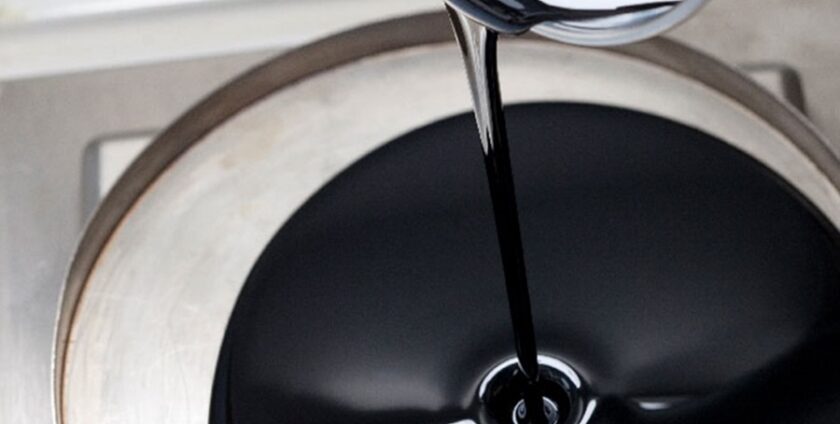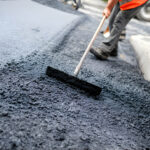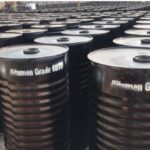
How Penetration Bitumen 35/50 is Produced – Process, Properties, and Industrial Value
Penetration Bitumen 35/50 is a hard-grade bitumen primarily used in high-stress environments such as industrial paving, airport runways, and heavy-duty road construction. This grade of bitumen is known for its high viscosity and lower penetration value, indicating superior hardness and durability. Understanding how Penetration Bitumen 35/50 is produced provides insight into its chemical integrity and industrial reliability.
Peak Universal Business is highlighted as a reliable supplier, ensuring high-quality bitumen products for diverse needs.
What is Penetration Bitumen 35/50?
Penetration Bitumen 35/50 is a type of bituminous binder derived from the distillation of crude oil. The numbers “35/50” refer to the penetration value range measured in deci-millimeters (dmm). Lower penetration values correspond to harder bitumen, making this grade suitable for projects that require high structural strength and resistance to deformation.
It is widely used in:
-
Heavy-duty roads and highways
-
Runway surfacing
-
Industrial pavement projects
-
Foundation waterproofing
🏭 How Penetration Bitumen 35/50 is Produced?
The production of penetration bitumen 35/50 involves several stages, each critical to achieving the desired properties of the final product. Here’s a detailed look at the production process:
1. ⚗️ Crude Oil Distillation
Heavy crude oil is introduced into a distillation column, where it is heated to separate lighter hydrocarbons. The residue left after atmospheric distillation is further processed.
2. 🔥 Vacuum Distillation
The atmospheric residue is subjected to vacuum distillation. This produces a heavy residue known as vacuum bottom, which is the base material for bitumen.
3. 🧪 Air Blowing (Optional)
In some cases, to increase hardness and adjust penetration values, the bitumen is subjected to mild air blowing. Air is passed through the vacuum residue under controlled temperature to oxidize the material slightly.
4. 🧊 Cooling and Grading
Once the desired hardness and viscosity are achieved, the bitumen is cooled and graded according to penetration tests. For 35/50 grade, the bitumen must fall within the 35 to 50 dmm penetration range.
📊 Technical Specifications of Penetration Bitumen 35/50
| Property | Unit | Value |
|---|---|---|
| Penetration @ 25°C | dmm | 35 – 50 |
| Softening Point (Ring & Ball) | °C | 52 – 60 |
| Ductility @ 25°C | cm | > 100 |
| Flash Point | °C | > 230 |
| Specific Gravity @ 25°C | – | 1.01 – 1.06 |
| Solubility in Trichloroethylene | % | > 99 |
🔍 Explanation of Key Properties:
-
Penetration: Indicates the hardness of bitumen.
-
Softening Point: Defines the temperature at which bitumen begins to soften.
-
Ductility: Measures elasticity and flexibility under stress.
-
Flash Point: Important for safety during heating and application.
Penetration Bitumen 35/50 Usage
1. Road Construction
Asphalt Concrete: Hard Grade Bitumen 35/50 is used as a binder in asphalt concrete mixtures for road construction. Its excellent adhesion and cohesion properties ensure a durable and resilient pavement structure.
Surface Dressing: It is used in surface dressing applications to provide a protective layer on roads, enhancing skid resistance and extending the lifespan of the pavement.
Base and Sub-Base Layers: Hard Grade Bitumen 35/50 is used in the construction of base and sub-base layers in roadways, providing structural integrity and stability.
2. Roofing
Bituminous Membranes:It is used in the production of bituminous membranes for flat and low-slope roofing systems. These membranes offer excellent waterproofing and protection against environmental factors.
Shingles: Hard Grade Bitumen 35/50 is used in the manufacture of bituminous shingles for pitched roofs, providing weather resistance and durability.
Roof Coatings:It is used in roof coatings to enhance the waterproofing and protective properties of roofing systems.
3. Waterproofing
Building Foundations: Penetration bitumen 35/50 is used in the waterproofing of building foundations, preventing water ingress and protecting the structural integrity of the buildings.
Bridges and Tunnels: It is used in the waterproofing of bridges and tunnels, offering protection against water penetration and corrosion.
Damp-Proof Courses: Hard Grade Bitumen 35/50 is used in damp-proof courses to prevent rising damp in masonry structures.
4. Industrial Applications
Bituminous Paints: It is used in the production of bituminous paints, providing protective coatings for metal, concrete, and wood surfaces.
Coatings and Sealants: Bitumen 35/50 is used in industrial coatings and sealants, offering excellent adhesion, flexibility, and resistance to weathering.
Adhesives: It is used as a base material in the production of bituminous adhesives for various industrial applications.
Industrial Applications of Bitumen 35/50
Heavy Traffic Roads
Used in construction of roads with high axle loads such as expressways and industrial access roads.
Runways and Taxiways
Due to its high resistance to deformation, Bitumen 35/50 is ideal for airport surfaces where aircraft loads are significant.
Rigid Pavement Layers
It serves as a strong binder for base and sub-base layers in composite pavements, improving load distribution.
Foundation Waterproofing
Its high softening point and viscosity make it suitable for industrial-grade waterproofing membranes and barrier coatings.
Harsh Climate Conditions
This bitumen resists rutting and bleeding under high temperatures, making it perfect for hot, dry climates.
✅ Advantages for Customers and Contractors
-
🏋️ High Load Bearing Capacity: Suitable for heavy-duty applications
-
🔥 High Thermal Stability: Resistant to high temperatures
-
💧 Low Permeability: Excellent water resistance
-
🧱 Long Service Life: Reduced maintenance and higher ROI
-
🧪 Consistent Performance: Stable under diverse site conditions
Durability: Penetration bitumen 35/50 offers excellent durability, making it suitable for high-stress applications such as road construction and roofing.
Adhesion and Cohesion: It provides strong adhesion and cohesion properties, ensuring the integrity and longevity of the structures it is used in.
Weather Resistance: Hard Grade Bitumen 35/50 is highly resistant to weathering, including UV radiation, temperature fluctuations, and moisture.
Waterproofing: It offers superior waterproofing properties, making it ideal for roofing and waterproofing applications.
Flexibility: Despite its hardness, penetration bitumen 35/50 retains sufficient flexibility to accommodate structural movements and thermal expansion.
Disadvantages of Penetration Bitumen 35/50
Temperature Sensitivity: Bitumen 35/50 can become brittle at low temperatures and soft at high temperatures, potentially affecting its performance in extreme climates.
Environmental Concerns: The production and use of bitumen can have environmental impacts, including emissions and the use of non-renewable resources.
Handling and Storage: Bitumen requires careful handling and storage at elevated temperatures to maintain its workability.
Initial Cost: The initial cost of bitumen-based materials can be higher compared to some alternatives, though their durability can offset these costs over time.
Price Factors of Penetration Bitumen 35/50
The price of penetration bitumen 35/50 is influenced by several factors, including:
Crude Oil Prices:
As bitumen is derived from crude oil, fluctuations in crude oil prices directly impact the cost of bitumen.
Supply and Demand:
Market dynamics, such as supply and demand, can significantly affect bitumen prices. High demand or limited supply can drive prices up.
Quality and Specifications:
The quality and specifications of bitumen, including the penetration grade and purity, influence its price. Higher quality bitumen with specific properties may command a premium price.
Transportation Costs:
The cost of transporting bitumen from production facilities to end-users can affect its final price, especially for regions far from production centers.
Processing and Refining Costs:
The costs associated with the refining and processing of crude oil to produce bitumen impact its price. More refined products with additional processing steps may be more expensive.
Geographical Location:
Regional market conditions, including local demand, availability, and regulatory factors, can influence the price of bitumen.
🔄 Comparison with Other Penetration Grades
| Property | 35/50 Bitumen | 60/70 Bitumen | 80/100 Bitumen |
| Hardness | High | Medium | Low |
| Penetration Value | 35 – 50 | 60 – 70 | 80 – 100 |
| Traffic Suitability | Heavy Loads | Medium Loads | Light Loads |
| Ideal Climate | Hot & Dry | Moderate | Cold & Wet |
Quality Tests for Penetration Bitumen 35/50
To ensure the quality and performance of penetration bitumen 35/50, several standard tests are conducted:
Penetration Test:
Measures the depth to which a standard needle penetrates the bitumen sample under specified conditions, determining its hardness.
Softening Point Test:
Determines the temperature at which bitumen softens, indicating its thermal stability.
Ductility Test:
Measures the ability of bitumen to stretch without breaking, indicating its flexibility.
Viscosity Test:
Evaluates the flow properties of bitumen at different temperatures, ensuring it meets the required specifications.
Flash Point Test:
Determines the temperature at which bitumen emits vapors that can ignite, indicating its safety during handling and application.
Solubility Test:
Measures the solubility of bitumen in solvents like trichloroethylene, indicating its purity and quality.
Environmental Considerations
The production and use of penetration bitumen 35/50 have environmental implications. Efforts are being made to minimize the environmental impact through the following measures:
Emission Control: Modern production facilities implement emission control technologies to reduce air pollution.
Sustainable Sourcing: Ensuring that crude oil is sourced from environmentally responsible suppliers.
Recycling: Using recycled materials in bitumen production and promoting the recycling of bituminous products.
Energy Efficiency: Implementing energy-efficient processes in the production and application of bitumen to reduce overall energy consumption and emissions.
Future Prospects
The future of penetration bitumen 35/50 looks promising with advancements in technology and increased focus on sustainability. Innovations in production processes, improved formulations, and enhanced recycling methods are expected to enhance the performance and environmental friendliness of bitumen. As infrastructure development continues globally, the demand for high-quality bitumen products is likely to grow.
FAQs about How is Penetration Bitumen 35/50 Produced
❓ What does Penetration 35/50 mean in bitumen?
Hard Grade Bitumen 35/50 refers to the hardness of the bitumen, measured in deci-millimeters (dmm). It indicates that a standard needle penetrates the bitumen between 35 and 50 dmm under controlled conditions, making it a hard-grade bitumen ideal for high-load applications.
❓ How is Bitumen 35/50 produced from crude oil?
Bitumen 35/50 is produced by vacuum distillation of heavy crude oil, sometimes followed by mild air blowing to achieve the desired hardness. The process removes lighter fractions and refines the residue to meet specific penetration, softening point, and ductility standards.
❓ What are the industrial uses of Penetration Bitumen 35/50?
It is commonly used in heavy-duty road construction, airport runways, rigid pavements, foundation waterproofing, and projects in hot climates due to its hardness and thermal resistance.
❓ How does Bitumen 35/50 compare to 60/70 or 80/100 grades?
Bitumen 35/50 is harder and has a lower penetration value compared to 60/70 and 80/100. This makes it more suitable for high-stress environments and hot climates where resistance to deformation and bleeding is critical.
❓ Can Bitumen 35/50 be used in cold climates?
While possible, it is not ideal. Bitumen 35/50 is better suited for hot, dry climates due to its stiffness. In cold climates, softer grades like 80/100 are preferred to prevent cracking.
📌 Conclusion- How is Penetration Bitumen 35/50 Produced
Penetration Bitumen 35/50 is a premium-grade binder tailored for projects requiring high structural strength, thermal resistance, and long-term performance. Its carefully controlled production process and consistent properties make it indispensable in industrial road construction and infrastructure development. For engineers, contractors, and developers, choosing 35/50 ensures safety, durability, and reduced lifecycle costs.
The price of bitumen is influenced by several factors, including crude oil prices, supply and demand, and transportation costs. Peak Universal Business, a trusted supplier, ensures the provision of high-quality bitumen products, meeting diverse needs and specifications.
📢 Call to Peak Universal Business
📞 Ready to order Penetration Bitumen 35/50 for your next infrastructure project?
📌 Contact us today for:
-
📄 Technical Data Sheets (TDS) & MSDS
-
🛢️ Bulk supply in drums or tankers
-
🏗️ Engineering support & recommendations
🔹 Request a Quote | 🔹 Download TDS | 🔹 Talk to a Bitumen Specialist
📧 Email: [email protected]
📞 Phone: +971 4 878 2031
🌐 Visit: PUBLtd. Bitumens
If You have any other Query or Question you want to ask, Please don’t hesitate to Contact Us.
You can Read More about Our products Here:
- 0 comment





Leave a Reply